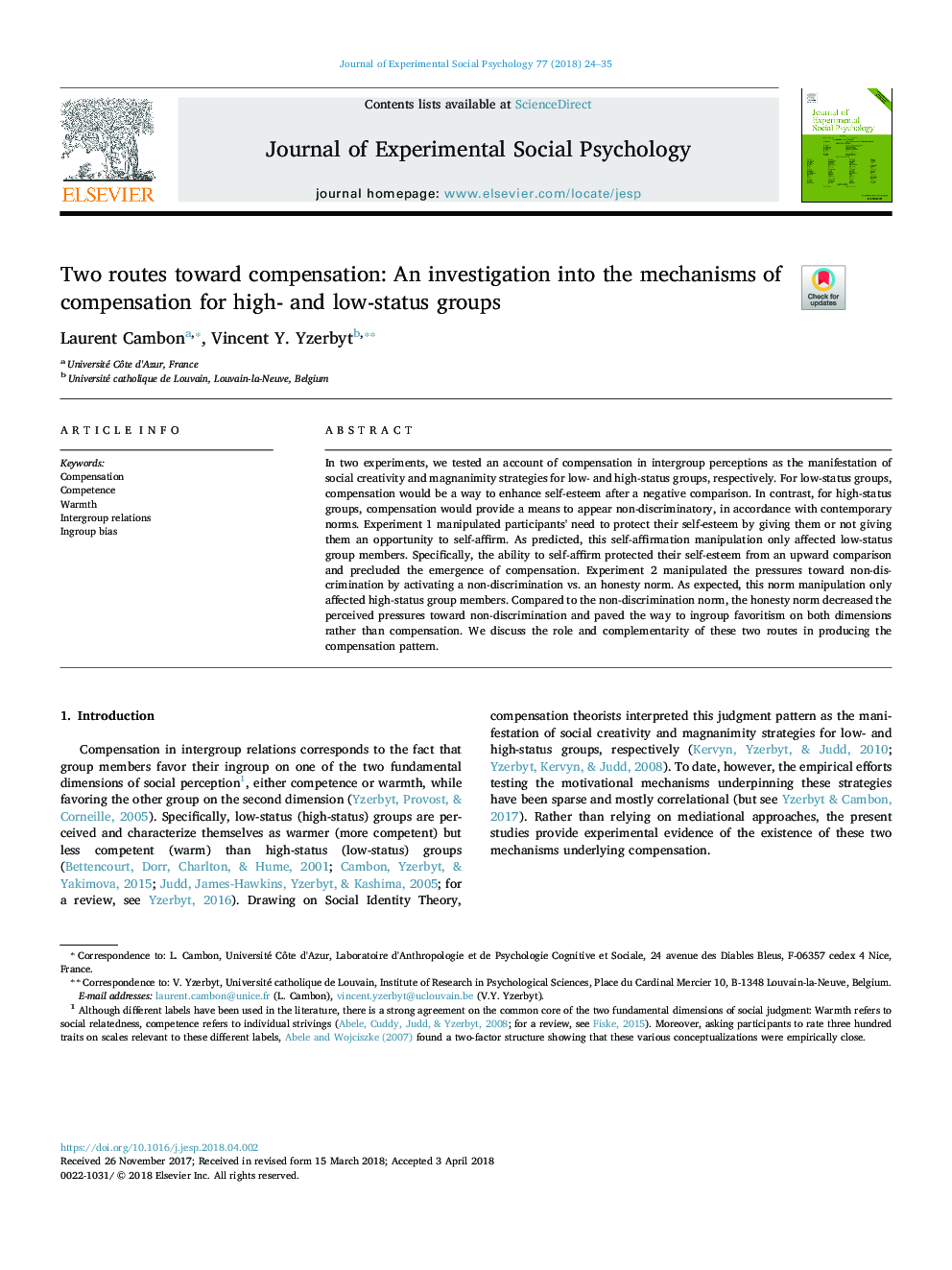| کد مقاله | کد نشریه | سال انتشار | مقاله انگلیسی | نسخه تمام متن |
|---|---|---|---|---|
| 7324015 | 1475846 | 2018 | 12 صفحه PDF | دانلود رایگان |
عنوان انگلیسی مقاله ISI
Two routes toward compensation: An investigation into the mechanisms of compensation for high- and low-status groups
ترجمه فارسی عنوان
دو راه برای جبران خسارت: تحقیق در مورد مکانیزم های جبران خسارت برای گروه های با درجه بالا و پایین
دانلود مقاله + سفارش ترجمه
دانلود مقاله ISI انگلیسی
رایگان برای ایرانیان
کلمات کلیدی
جبران خسارت، صلاحیت، گرما، روابط میان گروهی، تعصب درون گروهی،
ترجمه چکیده
در دو آزمایش، ما حساب جبران خسارت را در ادراک گروه بندی به عنوان تظاهرات خلاقیت های اجتماعی و استراتژی های بزرگگی برای گروه های کم و وضعیت بالا مورد آزمایش قرار دادیم. برای گروه های کم وضعیت، جبران خسارت می تواند راه افزایش عزت نفس پس از مقایسه منفی باشد. در مقابل، برای گروه های با درجه بالا، جبران خسارت به معنی عدم تبعیض آمیز است، مطابق با هنجارهای معاصر. آزمایشی 1، شرکت کنندگان را تحت تاثیر قرار می دهد تا از اعتماد به نفس خود مراقبت کنند و یا به آنها فرصت بدهند تا خود را تأیید کنند. همانطور که پیش بینی کرد، این دستکاری ادعایی تنها بر اعضای گروه کم وضعیت تأثیر گذاشت. به طور خاص، توانایی خودتنظیمی، اعتماد به نفس خود را از یک مقایسه به سمت بالا محافظت کرد و مانع ظهور جبران خسارت شد. آزمایشی 2 با فشار دادن به عدم تبعیض با استفاده از یک عدم تبعیض در مقابل یک عقیده صادقانه دستکاری کرد. همانطور که انتظار میرفت، این دستکاری تردید تنها بر اعضای گروه وضعیت بالا تاثیر گذاشت. در مقایسه با عدالت غیر تبعیض، عدالت صحی، فشارهای درک شده نسبت به عدم تبعیض را کاهش داد و راه را برای نفع گرائی در هر دو جنبه به جای جبران خسارت فراهم کرد. ما درباره نقش و مکمل بودن این دو مسیر در تولید الگوی جبران هزینه بحث می کنیم.
موضوعات مرتبط
علوم زیستی و بیوفناوری
علم عصب شناسی
علوم اعصاب رفتاری
چکیده انگلیسی
In two experiments, we tested an account of compensation in intergroup perceptions as the manifestation of social creativity and magnanimity strategies for low- and high-status groups, respectively. For low-status groups, compensation would be a way to enhance self-esteem after a negative comparison. In contrast, for high-status groups, compensation would provide a means to appear non-discriminatory, in accordance with contemporary norms. Experiment 1 manipulated participants' need to protect their self-esteem by giving them or not giving them an opportunity to self-affirm. As predicted, this self-affirmation manipulation only affected low-status group members. Specifically, the ability to self-affirm protected their self-esteem from an upward comparison and precluded the emergence of compensation. Experiment 2 manipulated the pressures toward non-discrimination by activating a non-discrimination vs. an honesty norm. As expected, this norm manipulation only affected high-status group members. Compared to the non-discrimination norm, the honesty norm decreased the perceived pressures toward non-discrimination and paved the way to ingroup favoritism on both dimensions rather than compensation. We discuss the role and complementarity of these two routes in producing the compensation pattern.
ناشر
Database: Elsevier - ScienceDirect (ساینس دایرکت)
Journal: Journal of Experimental Social Psychology - Volume 77, July 2018, Pages 24-35
Journal: Journal of Experimental Social Psychology - Volume 77, July 2018, Pages 24-35
نویسندگان
Laurent Cambon, Vincent Y. Yzerbyt,
